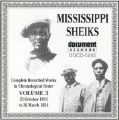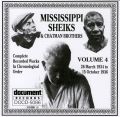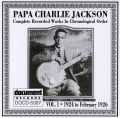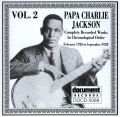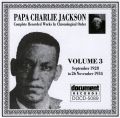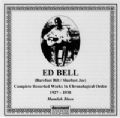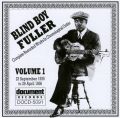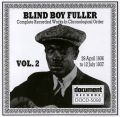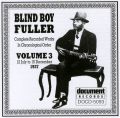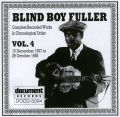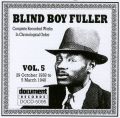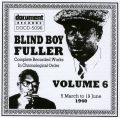"Document 5000 Series "
Viewing 85 to 96 of 700
|
Mississippi Sheiks Vol 3 1931 - 1934 Mississippi Sheiks
Includes; Walter Vincson, vocal, guitar; Lonnie Chatman, vocal, violin; Bo Carter, vocal, guitar, violin.
Genres: String Band, Mississippi Blues, Country Blues
Informative booklet notes by Chris Smith
Detailed discography
From this album's booklet notes:
The Mississippi Sheiks wrapped up their two days in Atlanta with four titles which show off Walter Vinson's guitar playing to particular advantage, as well as including some clever lyrics: When You're Sick With The Blues is hokum, but Bed Spring Poker gives an unusual warning of the dangers of sexual gambling. I've Got Blood In My Eyes For You was one of four titles from these sessions issued on Columbia, the parent company of Okeh. Around the time Columbia 14660-D was released, in June 1932, the Sheiks were recording for Paramount, which was in turn to terminate its 12/13000 race series towards the end of that year. The last two discs issued were both by the Mississippi Sheiks; all through the Depression they had been favourites with black record buyers, and it's not surprising that they were Paramount's last throw of the dice. Nor, perhaps, is it surprising that much of the session was devoted to remakes and rewrites. Inevitably, they cut further - and very fine - versions of Stop and Listen and Sitting On Top Of The World, and Don't Wake It Up (taken at a tearing speed) and Please Baby were second attempts at songs recorded in Atlanta the previous year. Shooting High Dice used the tune of W. C. Handy's "St. Louis Blues", while New Shake That Thing was a tribute to the enduring popularity of Papa Charlie Jackson's hit from 1925, given engaging new lyrics that celebrate the ability of Southerners to have fun. Continued...
More Info on our New Store >> |
||
|
Mississippi Sheiks Vol 4 1934 - 1936 Mississippi Sheiks: Bo Chatman (Carter), vocal, guitar; Lonnie Chatman, violin; Walter Vincson, vocal, guitar.
Chatman Brothers: Bo Chatman (Carter), vocal, guitar; Lonnie Chatman, vocal, violin; Sam Chatmon, vocal, guitar.
With contributions by Eugene Powell (Sonny Boy Nelson), guitar.
Genres: Mississippi Blues, Country Blues, String Bands, Blues Guitar, Blues Violin.
Informative booklet notes by Chris Smith.
Detaile discography.
From this album's booklet notes:
As discussed in the notes to DOCD-5085, Walter Vinson was replaced by Bo Carter on the first six numbers made at the Mississippi Sheiks' 26th March 1934 session; on You'll Work Down To Me Someday, however, Vinson can be clearly heard to take over on vocals and guitar, and on Somebody's Got To Help Me, which is set to his favourite "Overtime Blues" tune, he even identifies himself as "Poor Walter". After the Sheiks' ten titles, Bo Carter cut ten of his own, with Lonnie Chatmon playing fiddle on three of them.
The following day was less intensive, Bo making two titles and the Sheiks four. Walter Vinson is again present as a vocalist on all four songs, and his appears to be the only guitar on Lonesome Grave Took My Baby Away and Pop Skull Blues, which is a tribute to the powers of Texan whiskey. The former song is the Sheiks' last version of ‘Stop and Listen’, and not the least powerful of them. Sweet Maggie and Sales Tax were issued as by ‘Mississippi Sheiks with Bo Carter’, and Bo can be clearly heard singing and playing second guitar on both titles, which are respectively a remake of "Corrine Corrina" and a witty comment on the "three cents more" that had recently become "the Government's rule". Continued... More Info on our New Store >> |
||
|
Papa Charlie Jackson Vol 1: August 1924 to February 1926 Papa Charlie Jackson, vocal, banjo, guitar.
Includes:
2 tracks as by Ida Cox and Papa Charlie Jackson, vocal duet; accompanied by Charlie Jackson, banjo.
1 tracks as by Ida Cox, vocal; accompanied by Papa Charlie Jackson, banjo.
Review by Bruce Eder The first 27 of Papa Charlie Jackson's recorded works is, on about ten counts, one of the most important blues documents you can find, dating all the way back to August of 1924, before there was even electrical recording or a true definition to "blues." Indeed, the popular highlight is a dance number called Shake That Thing, which fairly overwhelmed a lot of Jackson's truer blues records with its beat. The opening number, Papa's Lawdy Lawdy Blues, shows a kind of formative blues, with it and its B-side Airy Man (aka "Hairy Man") Blues closer in spirit to comic novelty numbers. The hybrid banjo-guitar that Jackson played was an absolute necessity on these and his other early records, for it was more audible than any guitar of the era would have been, and serves to keep a beat as well as provide full accompaniment. Continued... More Info on our New Store >> |
||
|
Papa Charlie Jackson Vol 2: February 1926 to September 1928 Papa Charlie Jackson, vocal, banjo, guitar.
Includes 1 track by Freddie Keppard's Jazz Cardinals.
Genres: Per-war blues, blues banjo, early Chicago blues, jazz.
Informative booklet notes by Chris Smith.
Detailed discography.
Twenty-six of Papa Charlie Jackson’s recordings dating between February 1926 and September 1928, and an extraordinary volume this is. Now firmly ensconced in the electrical recording era, the sound on these records brings out the rich texture of Jackson’s banjo playing, and his singing is thoroughly enjoyable, as he runs through thinly veiled topical songs (Judge Cliff Davis Blues), playful romantic pieces (Butter and Egg Man Blues), bouncy rags (Look Out Papa Don’t Tear Your Pants), and more ambitious remakes of his early songs, most notably an outtake of Salty Dog, cut with Freddie Keppard’s Jazz Cardinals (with New Orleans jazz great Johnny Dodds on clarinet). Continued... More Info on our New Store >> |
||
|
Papa Charlie Jackson Vol 3: September 1928 to November 1934 Papa Charlie Jackson, vocal, banjo, guitar.
With additional tracks by;
Ma Rainey and Papa Charlie Jackson
Hattie McDaniels And Dentist Jackson (Papa Charlie Jackson)
Papa Charlie Jackson and Blind Blake
Genres: Pre-war blues, Country Blues, Early Chicago blues, Female blues.
Informative booklet notes by Chris Smith.
Detailed discography.
Papa Charlie Jackson's last 25 recordings, dating from September of 1928 through November of 1934, and doing more proper blues here than on either previous volume. By the time of the release of the material here, Jackson was one of the most seasoned of studio bluesmen, with nearly half a decade recording experience behind him — his vocal presence on all of these records is extraordinary, and he knows how to get the most out of his instrument, guitar or banjo. Continued...
More Info on our New Store >> |
||
|
Ed Bell 1927 - 1930 Ed Bell (Barefoot Bill, Sluefoot Joe), vocal, guitar.
Pillie Bolling, vocal guitar.
With contributions by Clifford Gibson, guitar.
Genres: Country blues, Country blues guitar.
Informative booklet notes by Roger Misiewicz.
Detailed discography.
Review:
Document's series of "complete recorded works in chronological order" has resulted not only in all of the performances being reissued of major prewar blues performers, but the work of quite a few minor personalities too.
Ed Bell, a singer/guitarist from Atlanta, lived until 1966 but made all of his recordings during 1927 and 1929-1930. One of his best sessions was cut one day in September 1927, a solo date resulting in four memorable lowdown blues. Otherwise, Bell is heard as "Sluefoot Joe," "Barefoot Bill From Alabama," and on two vocal-guitar duets with Pillie Bolling. Continued...
More Info on our New Store >> |
||
|
Blind Boy Fuller Vol 1: 23rd Spetmber 1935 to 29th April 1936 Blind Boy Fuller, vocal, guitar.
With contributions by, Blind Gary Davis, guitar; Bull City Red, washboard.
Genres: Country blues, Piedmont blues, Country blues guitar, ragtime guitar.
Informative booklet notes by Ken Romanowski.
Detailed discography.
Review by John Morthland Along with Blind Willie McTell, Fuller is the most compelling of the Piedmont bluesmen, an intricate guitarist and robust singer with a large and varied repertoire; he was also one of the last commercially potent country bluesmen. The North Carolina street singer was best known for nimble, acrobatic rags: Step It Up and Go and Trucking My Blues are the most enduring, though Rag, Mama, Rag (with Rev. Gary Davis), Piccolo Rag and Big Leg Woman Gets My Pay are nearly as strong. Davis was also devastating on slow blues like Keep Away From My Woman and My Brownskin Sugar Plum, and virtuoso slide workouts like Homesick and Lonesome Blues. entendres like What's That Smells Like Fish and suitably pious on gospel material like Davis' Twelve Gates to the City. He may have been a synthesizer rather than innovator, but hey, so was Robert Johnson. In the case of both men, nobody did it better. More Info on our New Store >> |
||
|
Blind Boy Fuller Vol 2: 29th April 1936 to 12th July 1937 Blind Boy Fuller, vocal, guitar.
With contributions by Dipper Boy Council, guitar; Bull City Red, washboard.
Genres: Country Blues, Piedmont Blues, Carolina Blues, Blues Guitar, Ragtime Guitar.
Inforamtive booklet notes by Ken Romanowski.
Detailed discography.
The second volume in Document's chronological overview of Blind Boy Fuller's life and music contains some of his most popular recordings, including the 1936 sessions which yielded both Truckin' My Blues Away (an update of Tampa Red's "What Is It That Tastes Like Gravy?") and Mama Let Me Lay It on You (a rendition of Memphis Minnie and Kansas Joe's "Can I Do It for You?"), both of them definitive versions. Continued... More Info on our New Store >> |
||
|
Blind Boy Fuller: Vol 3 12 July to 15th 1937 Blind Boy Fuller, vocal guitar.
With contributions by Sonny Terry, harmonica.
Genres: Country blues, Piedmont blues, Carolina blues, Blues guitar, Ragtime guitar.
Informative booklet notes by Ken Romanowski
Detailed discography.
Review by Jason Ankeny The 22 sides which comprise the third volume in Document's Blind Boy Fuller retrospective were all culled from sessions cut in the latter half of 1937; the first session, from mid-July, was recorded under the auspices of the Decca label, a situation which left Fuller's longtime manager J.B. Long -- as well as ARC Records -- none too happy. As a result, at the bluesman's next session, Long insisted he re-record many of the titles earlier cut for Decca, resulting in alternate takes of Bulldog Blues, Throw Your Yas Yas Back in Jail (a.k.a. "Put You Back in Jail") and Steel Hearted Woman (a.k.a. "Why Don't My Baby Write to Me"); for blues historians, the chance to compare and contrast the sessions will be irresistible. More Info on our New Store >> |
||
|
Blind Boy Fuller Vol 4: 15th December to 29th October 1937 - 1938 Blind Boy Fuller, vocal, guitar.
With contributions by Dipper Boy Council, guitar; Sonny Terry, harmonica; Charlie Austin, harmonica; Bull City Red, washboard.
Genres: Country blues, Piedmont blues, Blues guitar, Carolina blues, Ragtime guitar, Blues harmonica.
Informative booklet notes by Ken Romaowski.
Detailed discography.
Review by Jason Ankeny.
Beginning with the mid-December, 1937 session which kicks off this fourth volume in Document's retrospective, Blind Boy Fuller entered into a recording partnership with the legendary harpist Sonny Terry that continued for the remainder of Fuller's studio career. Terry's blistering harmonica and falsetto interjections lent an exciting new dynamic to Fuller's sound, as classic sides like Pistol Snapper Blues, Mean and No Good Woman and Georgia Ham Mama amply prove, each musician pushing the other to new creative heights. More Info on our New Store >> |
||
|
Blind Boy Fuller Vol 5: 29th October 1938 to 5th March 1940 Blind Boy Fuller, vocal, guitar.
With contributions by Sonny Terry, harmonica; Bull City Red, washboard; possibly Sonny Jones, guitar.
Genres: Country blues, Piedmont blues, Carolina blues, country blues guitar, Ragtime guitar, Blues harmonica.
Informative booklet notes by Ken Romanowski.
Detailed discography.
Review by Jason Ankeny:
Volume five in Document’s Blind Boy Fuller series is comprised primarily of two prolific sessions, the first recorded in Columbia, South Carolina on October 29, 1938 with harpist Sonny Terry and washboard player Bull City Red, the second a Memphis date from July 12, 1939 with Terry, Bull City Red (now going as Oh Red) and second guitarist Sonny Jones. The latter is perhaps the most impressive, yielding the signature song I Want Some of Your Pie as well as You’ve Got Something There (a rewrite of Buddy Moss’ “Daddy Don’t Care”) and Fuller’s immortal rendition of J.B. Long’s Step It Up and Go. More Info on our New Store >> |
||
|
Blind Boy Fuller Vol 6 1940 Blind Boy Fuller, vocal, guitar.
Brother George And His Sanctified Singers (Blind Boy Fuller)
With contributions by Sonny Terry, vocal, harmonica; Oh Red, washboard.
Genres: Country blyues, Piedmont blues, Carolina blues, Country blues guitar, Country blues harmonica.
Informative bookle notes by Ken Romanowski.
Detailed discography.
Review by Jason Ankeny: The sixth and final volume in the series assembles the fruits of Blind Boy Fuller’s final studio sessions, all dating to the first half of 1940. Despite failing health, Fuller is at his most incendiary on these sides — Shake It, Baby is among his most galvanizing dance tunes, while Little Woman You’re So Sweet stands as one of his finest originals. Most energetic, however, are the sanctified songs, including No Stranger Now, Jesus Is a Holy Man and Twelve Gates to the City — with his death less than a year away, Fuller burns with spiritual intensity, clearly yearning for some kind of redemption in his final months. More Info on our New Store >> |
||

